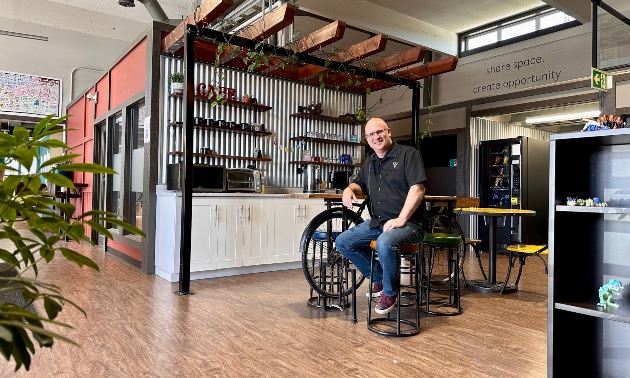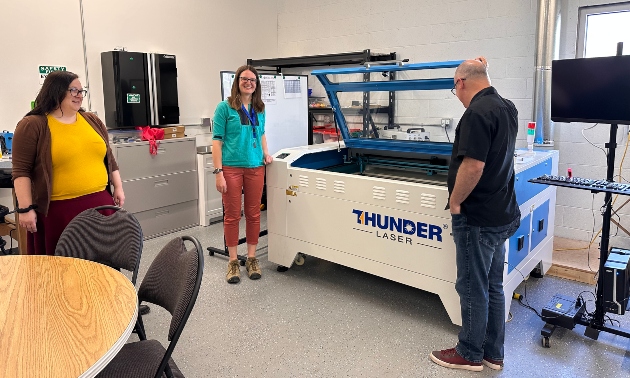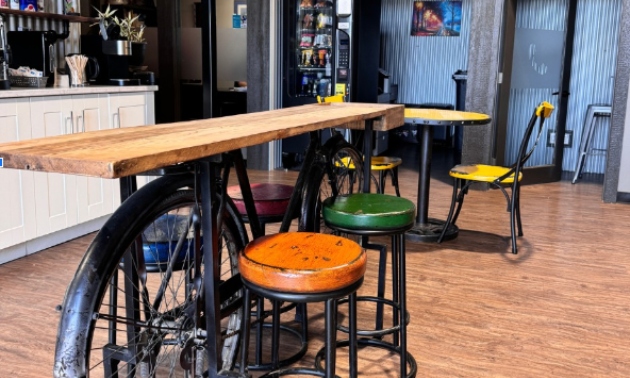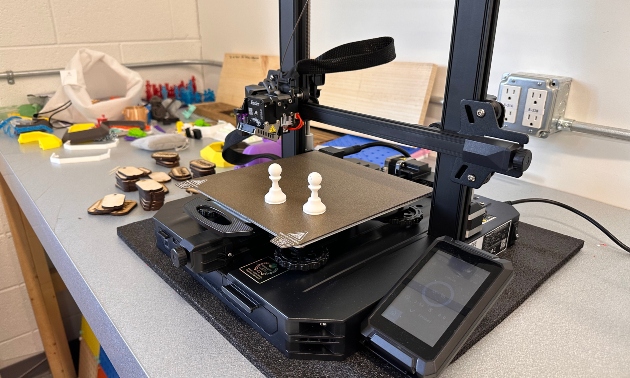CFEK bids farewell to a leader: Sean Campbell is moving on, while his work of fueling business growth continues.

Campbell has played a vital role in supporting new local businesses in the East Kootenay.
A look at the legacy that Campbell leaves behind with Community Futures and the Ground Floor Coworking Space in Cranbrook
Sean Campbell is the general manager at Community Futures East Kootenay (CFEK), an organisation providing alternative financing for small and medium-sized businesses. Unlike banks, Community Futures employs unique lending criteria with a focus on rural development. They collaborate with other business lenders, educational institutions, non-profits, and community governments to enhance the local economy.
He is also the general manager of the Ground Floor Coworking Space, a shared office space and hub for professionals in the region.
Campbell sat down with us to share his experiences and aspirations, shedding light on the pivotal role that CFEK and the Ground Floor play in supporting the growth of local businesses. Emphasizing the importance of generating revenue, he discussed the diverse economic landscape and the housing challenges faced by the region’s communities. As he plans his transition out of his current role, Campbell is committed to ensuring the continuity of CFEK for the benefit of its stakeholders. Looking ahead, he dreams of joining the Community Futures Provincial Association to bolster the network's growth and impact across British Columbia while maintaining his connections with the Kootenays.
Topics at a glance
- The role of Community Futures East Kootenay (CFEK) to support the growth of small businesses in Cranbrook and the East Kootenay.
- The genesis of the Ground Floor Coworking Space in Cranbrook and how it has grown since it opened in 2018
- Examples of how CFEK helped businesses to grow
- Challenges and opportunities for small business in Cranbrook / Kootenays
- What’s next for Sean Campbell

The Ground Floor includes a Makerspace, providing the community access to emerging technology like the Thunder laser machine (shown here) and several 3D printers.
Can you tell us a bit about what you do?
I'm the general manager of Community Futures East Kootenay and the Ground Floor Coworking Space, which are two separate non-profit organizations that work closely together. They have a common board of directors and a common manager, so it allows us to have an aligned mission and to accomplish what we want to in both networks that we work in.
The original genesis of the coworking space was—from CFEK's mission perspective—to create space for entrepreneurs and small businesses. Historically CFEK, (like all community futures offices), has provided financial support and access to training and advisory services. We thought we would just add to that by giving access to space. And then we were fortunate enough to bring in the Business Development Bank and Skilled Trades BC and additional support organizations. So under the Ground Floor roof, you can find Community Futures, and we're a good jumping-off point for other organizations like WeBC and Futurepreneur and All Nations Trust.
It absolutely is a community. Cindy Oberle, the community manager, has been instrumental in creating that and making sure everything's just right. People feel welcome. When people book offices and they need an A/B card or they want coffee or water or tea available for their clients or their guests, that all just comes together. She's fantastic at that.
Tell me about Community Futures and what features it offers
The Community Futures Program (consists of) 267 non-profit organizations across Canada. It was created around 1985 - 1986, and the overarching mandate is community economic development.
So, how do we work in rural communities in Canada to improve the prospects for businesses and for local professionals and young families? How do we grow to help those communities grow? The largest way in which you do that is by lending to small businesses. We provide loans from about $5,000 up into the millions of dollars to businesses to start, grow or expand. More recently, we're seeing a lot of business succession, transitions from a retiring owner to a younger one. That involves financing things like goodwill, which the banks don't often want to touch.
We're a really good fit for those types of businesses, and Community Futures also offers access to training platforms and then other advisory services. We have a group called the Consulting Hive which is actually managed by a Community Futures office on Vancouver Island—so our clients can access (at a fairly discounted rate) professional services. So we're a great first point of contact because we're also kind of non-proprietary in our advice. If you come to us with questions, we're not pushing our services unnecessarily. We're looking for the best fit—that's really important for entrepreneurs to know—that Community Futures is doing the best for their business not necessarily the best for our business.
So it's not just for new entrepreneurs starting a business?
No, and we've got touch points all the way up, absolutely the whole spectrum of the life of a business and pretty much any need that a business might have. From working capital for training or growing sales, to buying new equipment, to moving from a rented storefront to purchasing a place or building, or buying manufacturing equipment—basically anything that a small business, (specifically a business with under 500 employees), might need. And those needs can be quite small. Maybe for a home-based business it's a small ask, but for a manufacturing or fabrication shop, that new piece of equipment can run into the hundreds of thousands of dollars plus delivery and setup, so there can be quite a commitment.
What would be the first touch point?
Typically, the first touch point is something that we've really worked hard on over the last couple of years—our social media presence on LinkedIn, Instagram, and Facebook. We're hoping more and more people are hearing about us that way. That hopefully encourages people to visit our website and give us a call. There's lots of information on the website, but the thing about lending to small businesses is that we need to know the person. We don't just lend based on collateral like the banks do. We base it on business plans and a person's experience in the industry or business. Whether they have owned a business in the past is not as important, but they should know the industry and the market. So, we need to have that conversation one-on-one to do that.

The Ground Floor’s favourite meeting spot gives members and guests a place to meet, enjoy a coffee and get collaborative.
Tell us about the Ground Floor. Where did the inspiration come from?
Community Futures was kind of in the wrong location in Cranbrook. We were in a rental space in a light industrial area, kind of low-key and not easy to find. So I was thinking about how to get into the downtown core, to have a more professional presence in Cranbrook.
In 2017, we formed a coalition with two for-profit companies and bought the building with a large mortgage from the credit union. EK, now Stellar Vista, was incredibly supportive and forward-thinking. One of the partners, a developer-builder, helped with the renovation and design of the space. This partnership has been successful for the past six to seven years. It's been a positive experience, and it's a pretty cool place to hang out.
Has it taken a long time to educate people about what coworking is?
The growth has been slow, steady, and organic. We still have people who walk in the front door, and it's really fun to watch because they tend to take three or four steps, their eyes go up, and they look around before saying, "Wow, I never knew Cranbrook had anything like this." Then, we give them a tour, and they start saying things like, "There's so much space in here," and "It's so big." I've never lost the enjoyment of seeing that kind of wonder in someone else. A sense of community is important here, and everyone who works here takes security seriously, contributing to the safety of everyone else. So, it really is that kind of community.
How well is the coworking space used?
Out of the 25 offices that we have, two are dedicated as office-for-a-day and they get regular use. Of the remaining 23 offices, 22 are currently rented out, and we have eight dedicated desks, of which seven are rented out to members.
In addition to the offices and dedicated desks, we have four meeting room spaces of various sizes for people who just come in and use the space occasionally. We have a phone booth that they can use for Zoom calls or phone calls without having to book a larger room. People are really learning to work together, even when their businesses aren't related. Those water cooler talks or conversations around the coffee machine, even when the businesses aren't related, show that many businesses and people face the same issues, whether personal challenges or successes. Sharing their successes, like a successful hockey or lacrosse tournament on the weekend, creates fun conversations that you wouldn't get if you were working from home. So it's not just about connecting people in here, it's about connecting the larger community.
What have you enjoyed about your position at CFEK?
Another thing I love about working with Community Futures: the size of our region. I get to work with eight chambers of commerce, nine local governments, two Indigenous nations, four Indigenous communities, and two regional districts. It's such a variety of projects, initiatives, and priorities in different communities. It makes it easy to become involved in things that matter.
Can you share some of your successes?
Actually, let's talk about one of the entrepreneurs here at the Ground Floor. When we first opened, he won a Nomad membership for one month as part of a draw. After a few months, he decided that he was going to take a dedicated desk. So, he moved up to a dedicated desk.
He had actually just started up his own business. He's an archaeologist and had been working for another company locally but started up his own. So, he was working from home and from his truck. He came to one of our opening events and won the membership. So, he actually moved from desk to office to a two-person office to our largest team office, and now he's got three people working in there.
Plus, he's a member and has taken a second regular standard office. We've just watched his business grow, and you know, he's grown his team, his fleet of vehicles, and his contracts. We've watched that from the ground, and eventually, we know that he's gonna grow to the point where he doesn't fit in the building anymore, right? But that's a success when somebody grows their business and kind of graduates out. That's great for them, right? And then, if you look at that and say we were a part of that.
Community Futures is much the same way. We've provided very creative financing to two very different businesses. One business was working with the Royal Bank, but they wanted to do an expansion and take on a whole new line of products. However, their bank said, "Well, your debt-to-equity is going to be too high, so we can't lend you any more money, and nobody else can lend you any more money." So, we worked with the Royal Bank and did a round of equity financing where we bought shares in the company. In return for those shares, we took a small royalty on sales, which is not technically debt, so we fit our financial support into the constraints of their traditional financial institution's rules.
Could you discuss what it takes to run a successful business?
What it takes to run a successful business probably hasn't changed much over time.
The thing it takes to be a successful entrepreneur is perseverance, I think, and a commitment to doing what you know and loving it. We actually don't see that many failures. It's really a satisfying or rewarding piece of statistic that small businesses with support from Community Futures offices have higher success rates, a better chance to survive that initial five-year period, hire more people, and their sales grow faster. Stats Canada actually does an analysis of the Community Futures program in Canada every five years, and this is consistently over the last 35 years. These businesses do fare better when they get support from Community Futures.
What else contributes to the higher success rate of companies supported by Community Futures?
I think the pre-work is important before they even apply for a loan—working with us on refining the business plan, letting us critique that business plan, and providing objective feedback on where there might be weaknesses or where there may not be enough information.
Then there's the financing aspect, but afterwards, supporting them when sales don't grow as quickly as anticipated or when unexpected costs arise. We can adjust loan payments, offer interest-only periods, and make repayment flexible. I think this flexibility is one of the major contributors to their survival and their ability to hire. We're genuinely interested in their success and become personally invested in their projects and businesses.
When they come back and express concerns about hiring or other challenges, we're there to help. For instance, if they're unsure about hiring their first employee due to financial constraints, we might suggest a small loan to cover wages for a few months until they're more comfortable. We also guide them towards resources like online courses for human resources management, ensuring they have the support and knowledge they need to succeed.
What's the average length of time that businesses use your lending services?
It's kind of all over the map—our goal for a client is to be a client for about three to five years. That is typically the time it takes for a business to develop a track record where a traditional bank will then lend to them and give them a line of credit. During that three to five year period, we work with business owners, we coach them on what the banks are going to expect from them, how to be a good bank client. And then when they transition to a bank, we don't charge any penalties or fees or early payout charges or anything like that. We want them to be successful.

The Makerspace is helping to engage youth by letting them bring their creations to life with hands on equipment like 3D printers.
You're investing in technology for the region—what is your vision for its future?
We're engaging with high school students, Boys and Girls Clubs, colleges, STEM camps, and similar initiatives, aiming to teach them how to utilize technology, design programs, and applications. Additionally, we're showing them how to bring their designs to life using tools like 3D printing and lasers. This is intriguing because it suggests that we're paving a potential career path for young people in technology, design, and the arts—areas they may not have been exposed to otherwise, or at least not at this stage of their lives where such exposure could spark a passion.
What do you perceive as the advantages of our region, particularly Cranbrook?
It's probably the diversity of the economy. Tourism is very strong, but forestry, mining, and resource extraction are also present. Additionally, there are numerous small businesses that support these major employers and all of the poeple who work for those businesses. So it really is an interesting ecosystem of different economies. When we're at the table with economic development folks from the Elk Valley, the conversations and challenges may be similar, but the way they're addressing and prioritizing them is just slightly different.

"Wow, I never knew Cranbrook had anything like this."—Sean Campbell on first impressions of the Ground Floor Coworking Space
I understand you're moving on. That must not have been an easy decision...
No, it was not an easy decision. It was a personal decision—we're actually seven years into our five-year plan as COVID threw quite a wrench into things. My parents retired to Qualicum Beach about 12 years ago. When we started visiting them there, we discovered how much we enjoyed being near the ocean. Golfing in February is a real treat, things like that. We also realized that my parents' grandkids, my kids, wouldn't really see their grandparents very much unless we were living closer to them. And so we made the decision to move out there. It was a pretty easy decision given the weather and the climate, as it's very similar. We're not losing mountains, and we're not losing trails and streams, we're just adding the ocean to that mix.
We're staying in our province and I'm continuing my move west. I was born in Manitoba, moved when I was a kid to Alberta, then moved to Cranbrook, and now—I'm chasing the sun, I guess.
It seems like you're leaving Community Futures and the Ground Floor in a good state
Yes, I'm tremendously happy with where both organizations are right now. Whoever succeeds me, whoever comes in next, has a good kind of a jumping-off point, I think, of whatever vision they bring, their work with the Board of Directors on the next strategic plan for Community Futures. They're going to bring in a different perspective and something new, something that I don't have in my mind, something I haven't thought of, and they've got a great team, so they're secure. The teams are experienced, and they're strong and dedicated. There are 11 employees across both organizations. They all have different roles and they all have different priorities but they all work together really well and if one person is away at a conference or is out sick for a day, everybody steps in as much as they can. I mean, there's a certain amount of expertise you can't replace, but we step in where we can. So that sense of teamwork is something I certainly hope continues after I'm gone.
Is there anything else you would like to mention about Community Futures or the Ground Floor?
When you look at the interest earned as revenue that you can then use to further your mission, you're really a social enterprise. I think over the past few years we've really leaned into that and bought into the idea that these are social enterprises and that we earn revenues. As a nonprofit we use that revenue to do more cool stuff to help entrepreneurs and young professionals or more professionals in general become more successful.
So that social enterprise mindset for us is really important—it's going to inform the strategic planning that the organization will do in the fall. We have to be the architects of our own success and we have to use our resources strategically.
Learn more about Ground Floor Coworking Space
Learn more about Community Futures East Kootenay
